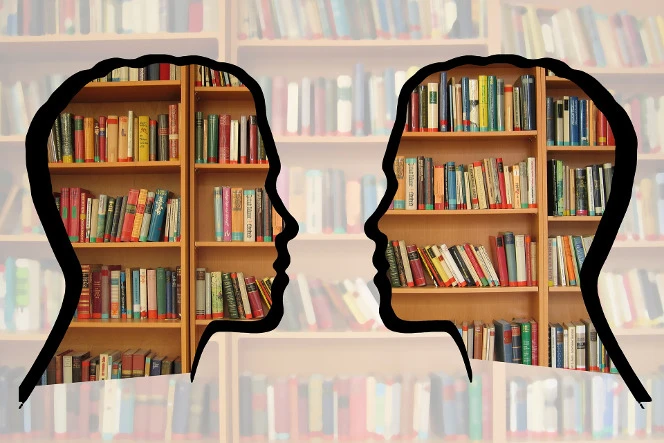Media and Information Literacy in Critical Times
UNESCO’s Global Media and Information Literacy week, 25 Oct – 1 Nov, places a spotlight on the role of media and information literacy to foster social inclusion and encourage intercultural dialogue.
‘If it were possible to define generally the mission of education, it could be said that its fundamental purpose is to ensure that students benefit from learning in ways that allow them to participate fully in public, community and economic life.’ — New London Group

Silhouette head bookshelf know by Gerd Altmann. CC0 1.0.
Re-imagining ways of learning and information environments
The 2017 theme for UNESCO’s Global Media and Information Literacy week is “Media and Information Literacy in Critical Times: Re-imagining Ways of Learning and Information Environments”. This is particularly appropriate with the current emphasis on ‘fake news’, the ever changing information environment we exist within, and the importance of diversity and inclusion within our communities.
#MILCLICKS
Media and Information Literacy: Critical thinking and creativity, Literacy, Intercultural, Citizenship, Knowledge, Sustainability, or MIL CLICKS for short, is a social media initiative, led by UNESCO, to expose people to media and information literacy capabilities and skills through their use of social media.
Anyone can get involved via Facebook, Twitter, or Instagram.
On October 28, a range of experts will post their tweets in response to a topic relating to this year’s theme using the hashtag #MILCLICKS. Anyone with a Twitter account can tweet questions and the expert will respond. These sessions will be run three times across different time zones to accommodate the global nature of this event.
Other key components
In addition to #MILCLICKS, MIL week 2017 includes a number of other key components:
a MIL Week Youth Agenda — an extension of the 10th UNESCO Global Youth Forum in Paris
GAPMIL awards — recognising expertise or advocacy in connection with one or more of cultural, ethnic and gender equality; diversity and pluralism; tolerance, peace and efforts aimed at countering hate; intercultural/interreligious dialogue and equality; freedom of expression, access to or right to information; privacy; international cooperation on MIL
a feature conference in Jamaica — focusing on how to educate citizens about MIL in a variety of contexts
other events from around the globe — you can even register your own event and showcase it on a world map.
Ways to get involved
If you have been thinking about the area of media and information literacy you may want to consider the ten suggested ways of celebrating Global MIL Week:
Organise a MIL Day.
Mainstream MIL topic at universities.
Use social media to raise awareness about MIL in civil society.
Send a letter.
Give a voice to the youth.
Join the Global Alliance for Media and Information Literacy (GAPMIL).
Create new partnerships, locally or regionally, to promote MIL in society.
Promote UNESCO’s publications and actions.
Promote or enroll in the media and information literacy online course.
Participate in global online debates.
‘Giving youth a voice’ could be an aspect that you might support in the library by inviting your school’s debating team to debate an issue relating to MIL. You might set up a number of discussions and interviews around MIL and intercultural dialogue which could be covered by your school newspaper, newsletter or social media accounts.
Think too about your collection and how inclusive it is — an inclusive library collection reflects the diversity of your school in ways that support teaching and learning.
Building an inclusive collection
You can also think about how your library can contribute to the development of media, information and digital literacy through your collection and services.
Your library’s role in supporting digital literacy
Media and information literacy can be important aspects of successful inquiry learning as students immerse themselves, explore, gather and evaluate a range of sources.
Make 2017 the year that you focus on MIL in your school and promote conversation, discussion, and learning around this important UNESCO initiative.
‘We live in a world where the quality of information we receive largely determines our choices and ensuing actions, including our capacity to enjoy fundamental freedoms and the ability for self-determination and development.’ — Media and Information Literacy Curriculum for Teachers, UNESCO